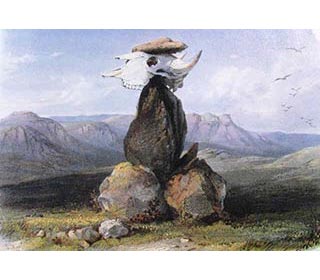Flint was used for the manufacture of Stone Age flint tools as it splits into thin, sharp splinters called flakes when struck by another hard object such as a hammerstone. Flint implements and tools were used by Native American Indians before the use of metals to make tools and weapons such as axes, arrows, spears, knives, tomahawks, etc. All of these objects were commonly made of flint, but other hard stones such as chert, jasper, chalcedony, granite, basalt and sandstone was also used. Flint or Chert?
The words Flintstone, Firestone, Hornstone, and Silex are other names for flint and chert. Sometimes "chert" is used as the more general term, with flint being the darker variant. The original rock or piece of flint is referred to as the core. Finding Flint
Flint is easy to find as it is often covered by a thin white layer and, in contrast to the other small rocks and pebbles, it has an irregular shape. The surface of flint is also smooth and not grainy as most rocks. Flint is found along rocky riverbeds, on beaches and in chalk, a soft limestone. Flint is also found as fillings in cracks in other types of rock. Making Stone Tools from Flint - The Flint Knapper and Flint Knapping
Stone Tools were made from either ground stone or chipped stone. A person who creates tools out of flint is known as a flint knapper. A flint knapper makes stone tools using flint including arrowheads, projectile points for spears, hand axes etc. The process is called Flint Knapping. Flint knapping involves a reduction process of the original stone of flint. Flakes of stone are broken off the of the original piece of flint. How to make Stone Tools from Flint
To make a projectile point, like an arrowhead or spear point, the piece of flint is directly struck with a hammerstone to remove large sharp flakes and break it into usable pieces of stone. A hammerstone is the archaeological name used for an object used as a prehistoric hammer. By banging the piece of flint large, thin, sharp flakes of stone are produced - basically the original piece of flint is reduced in size making a thinner piece of flint in the required thickness. The next step is called pressure flaking. Pressure flaking is achieved by placing a pointed tool, such as an antler horn or piece of bone on the edge of the stone, and applying an inward pressure to the tool to remove a small, thin flake from the stone. The objective of pressure flaking is to shape and refine the projectile point. Native Indian tools - List of Different Types of Flint tools
Flint could be used to produce to a number of different types of Stone tools including those detailed on the following list of tools: - Adze: A stone tool used like a chisel to work wood
- Drift: A tool usually made of antler, which was used in the indirect percussion flaking process
- Billet: A bone or antler tool used for flaking flint
- Axe: A large, cutting tool
- Flaking Tool: A tool, such as an antler billet or drift, used in removing flakes during the making of flint tools and weapons
- Scrapers: Tools made from a flake of flint that has small flakes removed from one side to create a working edge. Suitable for scraping and cleaning animal hides
- Knives: Tools which were flaked to form one or more cutting edges
- Graver: A small tool with a sharp tip that was used to engrave stone, bone, or wood
- Drill: An oblong tool made of flaked stone used in drilling holes in hide, wood or leather
- Crescent: A 1/4 moon shaped tool used as a type of scythe or scraper
- Cutting Flakes & blades: Waste Flakes were used as blades and cutting tools
- Borers: A flint tool for piercing holes
- Tranchet: Stone Tool used for cutting
- Awls: A bone or flint stone tool tapered to a point and used to pierce holes
- Microliths: Small, narrow blades used in combination for various tools where they are attached to wooden shaft to make arrows, reaping tools, harpoons, drill bits
- Burin - A tool flaked into a chisel point for inscribing or grooving bone, stone, wood, leather, or antler.
- Saws: Flint flakes were worked to create a toothed edge to make a saw-like tool
- Microblade: A long, narrow blade, usually less than 2 inches long
- Hammerstone: a hard, often oblong or rounded stone, used in flint knapping
Native Indian Flint tool - Stone Age Culture
The Stone Age life style of Native Americans ranged from nomadic, semi-nomadic to static across the vast continent of North America and despite this many of them shared similar culture and tools such as the Flint tool. The basic component of the majority of their their tools including were stone. |
